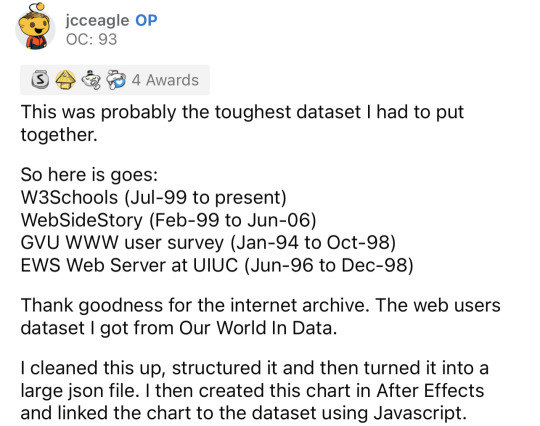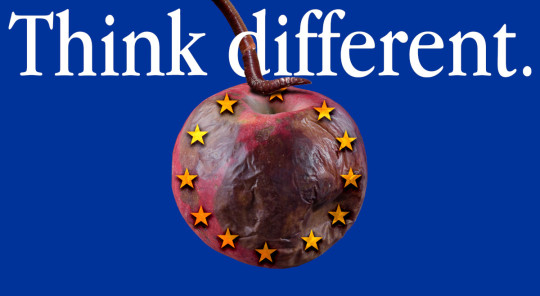#mozilla
Text

Firefox 2.0 CD from the Mozilla Store (2007)
443 notes
·
View notes
Text

Reddit • YouTube
#data#top post#statistics#web browsers#chrome#google chrome#educational#Firefox#opera#mozilla#mozilla firefox#internet explorer#internet#statistical data#video#Netscape#data is beautiful#I still use Firefox and probably will forever unless it closes down#switch from your default browser to Firefox and use DuckDuckGo’s search engine#this goes for mobile users too.
104K notes
·
View notes
Text
Mozilla? Chrome? Step aside, browser warriors.


We've found the winner.
#Pokemon#Pokemon silver#Pokemon gold#Mario tennis#Mario#Nintendo#internet browser#chrome#firefox#mozilla#lugia#2000s internet#2000s#millennial
6K notes
·
View notes
Text
Apple to EU: “Go fuck yourself”

If you'd like an essay-formatted version of this post to read or share, here's a link to it on pluralistic.net, my surveillance-free, ad-free, tracker-free blog:
https://pluralistic.net/2024/02/06/spoil-the-bunch/#dma

There's a strain of anti-anti-monopolist that insists that they're not pro-monopoly – they're just realists who understand that global gigacorporations are too big to fail, too big to jail, and that governments can't hope to rein them in. Trying to regulate a tech giant, they say, is like trying to regulate the weather.
This ploy is cousins with Jay Rosen's idea of "savvying," defined as: "dismissing valid questions with the insider's, 'and this surprises you?'"
https://twitter.com/jayrosen_nyu/status/344825874362810369?lang=en
In both cases, an apologist for corruption masquerades as a pragmatist who understands the ways of the world, unlike you, a pathetic dreamer who foolishly hopes for a better world. In both cases, the apologist provides cover for corruption, painting it as an inevitability, not a choice. "Don't hate the player. Hate the game."
The reason this foolish nonsense flies is that we are living in an age of rampant corruption and utter impunity. Companies really do get away with both literal and figurative murder. Governments really do ignore horrible crimes by the rich and powerful, and fumble what rare, few enforcement efforts they assay.
Take the GDPR, Europe's landmark privacy law. The GDPR establishes strict limitations of data-collection and processing, and provides for brutal penalties for companies that violate its rules. The immediate impact of the GDPR was a mass-extinction event for Europe's data-brokerages and surveillance advertising companies, all of which were in obvious violation of the GDPR's rules.
But there was a curious pattern to GDPR enforcement: while smaller, EU-based companies were swiftly shuttered by its provisions, the US-based giants that conduct the most brazen, wide-ranging, illegal surveillance escaped unscathed for years and years, continuing to spy on Europeans.
One (erroneous) way to look at this is as a "compliance moat" story. In that story, GDPR requires a bunch of expensive systems that only gigantic companies like Facebook and Google can afford. These compliance costs are a "capital moat" – a way to exclude smaller companies from functioning in the market. Thus, the GDPR acted as an anticompetitive wrecking ball, clearing the field for the largest companies, who get to operate without having to contend with smaller companies nipping at their heels:
https://www.techdirt.com/2019/06/27/another-report-shows-gdpr-benefited-google-facebook-hurt-everyone-else/
This is wrong.
Oh, compliance moats are definitely real – think of the calls for AI companies to license their training data. AI companies can easily do this – they'll just buy training data from giant media companies – the very same companies that hope to use models to replace creative workers with algorithms. Create a new copyright over training data won't eliminate AI – it'll just confine AI to the largest, best capitalized companies, who will gladly provide tools to corporations hoping to fire their workforces:
https://pluralistic.net/2023/02/09/ai-monkeys-paw/#bullied-schoolkids
But just because some regulations can be compliance moats, that doesn't mean that all regulations are compliance moats. And just because some regulations are vigorously applied to small companies while leaving larger firms unscathed, it doesn't follow that the regulation in question is a compliance moat.
A harder look at what happened with the GDPR reveals a completely different dynamic at work. The reason the GDPR vaporized small surveillance companies and left the big companies untouched had nothing to do with compliance costs. The Big Tech companies don't comply with the GDPR – they just get away with violating the GDPR.
How do they get away with it? They fly Irish flags of convenience. Decades ago, Ireland started dabbling with offering tax-havens to the wealthy and mobile – they invented the duty-free store:
https://en.wikipedia.org/wiki/Duty-free_shop#1947%E2%80%931990:_duty_free_establishment
Capturing pennies from the wealthy by helping them avoid fortunes they owed in taxes elsewhere was terribly seductive. In the years that followed, Ireland began aggressively courting the wealthy on an industrial scale, offering corporations the chance to duck their obligations to their host countries by flying an Irish flag of convenience.
There are other countries who've tried this gambit – the "treasure islands" of the Caribbean, the English channel, and elsewhere – but Ireland is part of the EU. In the global competition to help the rich to get richer, Ireland had a killer advantage: access to the EU, the common market, and 500m affluent potential customers. The Caymans can hide your money for you, and there's a few super-luxe stores and art-galleries in George Town where you can spend it, but it's no Champs Elysees or Ku-Damm.
But when you're competing with other countries for the pennies of trillion-dollar tax-dodgers, any wins can be turned into a loss in an instant. After all, any corporation that is footloose enough to establish a Potemkin Headquarters in Dublin and fly the trídhathach can easily up sticks and open another Big Store HQ in some other haven that offers it a sweeter deal.
This has created a global race to the bottom among tax-havens to also serve as regulatory havens – and there's a made-in-the-EU version that sees Ireland, Malta, Cyprus and sometimes the Netherlands competing to see who can offer the most impunity for the worst crimes to the most awful corporations in the world.
And that's why Google and Facebook haven't been extinguished by the GDPR while their rivals were. It's not compliance moats – it's impunity. Once a corporation attains a certain scale, it has the excess capital to spend on phony relocations that let it hop from jurisdiction to jurisdiction, chasing the loosest slots on the strip. Ireland is a made town, where the cops are all on the take, and two thirds of the data commissioner's rulings are eventually overturned by the federal court:
https://www.iccl.ie/digital-data/iccl-2023-gdpr-report/
This is a problem among many federations, not just the EU. The US has its onshore-offshore tax- and regulation-havens (Delaware, South Dakota, Texas, etc), and so does Canada (Alberta), and some Swiss cantons are, frankly, batshit:
https://lenews.ch/2017/11/25/swiss-fact-some-swiss-women-had-to-wait-until-1991-to-vote/
None of this is to condemn federations outright. Federations are (potentially) good! But federalism has a vulnerability: the autonomy of the federated states means that they can be played against each other by national or transnational entities, like corporations. This doesn't mean that it's impossible to regulate powerful entities within a federation – but it means that federal regulation needs to account for the risk of jurisdiction-shopping.
Enter the Digital Markets Act, a new Big Tech specific law that, among other things, bans monopoly app stores and payment processing, through which companies like Apple and Google have levied a 30% tax on the entire app market, while arrogating to themselves the right to decide which software their customers may run on their own devices:
https://pluralistic.net/2023/06/07/curatorial-vig/#app-tax
Apple has responded to this regulation with a gesture of contempt so naked and broad that it beggars belief. As Proton describes, Apple's DMA plan is the very definition of malicious compliance:
https://proton.me/blog/apple-dma-compliance-plan-trap
Recall that the DMA is intended to curtail monopoly software distribution through app stores and mobile platforms' insistence on using their payment processors, whose fees are sky-high. The law is intended to extinguish developer agreements that ban software creators from informing customers that they can get a better deal by initiating payments elsewhere, or by getting a service through the web instead of via an app.
In response, Apple, has instituted a junk fee it calls the "Core Technology Fee": EUR0.50/install for every installation over 1m. As Proton writes, as apps grow more popular, using third-party payment systems will grow less attractive. Apple has offered discounts on its eye-watering payment processing fees to a mere 20% for the first payment and 13% for renewals. Compare this with the normal – and far, far too high – payment processing fees the rest of the industry charges, which run 2-5%. On top of all this, Apple has lied about these new discounted rates, hiding a 3% "processing" fee in its headline figures.
As Proton explains, paying 17% fees and EUR0.50 for each subscriber's renewal makes most software businesses into money-losers. The only way to keep them afloat is to use Apple's old, default payment system. That choice is made more attractive by Apple's inclusion of a "scare screen" that warns you that demons will rend your soul for all eternity if you try to use an alternative payment scheme.
Apple defends this scare screen by saying that it will protect users from the intrinsic unreliability of third-party processors, but as Proton points out, there are plenty of giant corporations who get to use their own payment processors with their iOS apps, because Apple decided they were too big to fuck with. Somehow, Apple can let its customers spend money Uber, McDonald's, Airbnb, Doordash and Amazon without terrorizing them about existential security risks – but not mom-and-pop software vendors or publishers who don't want to hand 30% of their income over to a three-trillion-dollar company.
Apple has also reserved the right to cancel any alternative app store and nuke it from Apple customers' devices without warning, reason or liability. Those app stores also have to post a one-million euro line of credit in order to be considered for iOS. Given these terms, it's obvious that no one is going to offer a third-party app store for iOS and if they did, no one would list their apps in it.
The fuckery goes on and on. If an app developer opts into third-party payments, they can't use Apple's payment processing too – so any users who are scared off by the scare screen have no way to pay the app's creators. And once an app creator opts into third party payments, they can never go back – the decision is permanent.
Apple also reserves the right to change all of these policies later, for the worse ("I am altering the deal. Pray I don't alter it further" -D. Vader). They have warned developers that they might change the API for reporting external sales and revoke developers' right to use alternative app stores at its discretion, with no penalties if that screws the developer.
Apple's contempt extends beyond app marketplaces. The DMA also obliges Apple to open its platform to third party browsers and browser engines. Every browser on iOS is actually just Safari wrapped in a cosmetic skin, because Apple bans third-party browser-engines:
https://pluralistic.net/2022/12/13/kitbashed/#app-store-tax
But, as Mozilla puts it, Apple's plan for this is "as painful as possible":
https://www.theverge.com/2024/1/26/24052067/mozilla-apple-ios-browser-rules-firefox
For one thing, Apple will only allow European customers to run alternative browser engines. That means that Firefox will have to "build and maintain two separate browser implementations — a burden Apple themselves will not have to bear."
(One wonders how Apple will treat Americans living in the EU, whose Apple accounts still have US billing addresses – these people will still be entitled to the browser choice that Apple is grudgingly extending to Europeans.)
All of this sends a strong signal that Apple is planning to run the same playbook with the DMA that Google and Facebook used on the GDPR: ignore the law, use lawyerly bullshit to chaff regulators, and hope that European federalism has sufficiently deep cracks that it can hide in them when the enforcers come to call.
But Apple is about to get a nasty shock. For one thing, the DMA allows wronged parties to start their search for justice in the European federal court system – bypassing the Irish regulators and courts. For another, there is a global movement to check corporate power, and because the tech companies do the same kinds of fuckery in every territory, regulators are able to collaborate across borders to take them down.
Take Apple's app store monopoly. The best reference on this is the report published by the UK Competition and Markets Authority's Digital Markets Unit:
https://assets.publishing.service.gov.uk/media/63f61bc0d3bf7f62e8c34a02/Mobile_Ecosystems_Final_Report_amended_2.pdf
The devastating case that the DMU report was key to crafting the DMA – but it also inspired a US law aimed at forcing app markets open:
https://www.congress.gov/bill/117th-congress/senate-bill/2710
And a Japanese enforcement action:
https://asia.nikkei.com/Business/Technology/Japan-to-crack-down-on-Apple-and-Google-app-store-monopolies
And action in South Korea:
https://www.reuters.com/technology/skorea-considers-505-mln-fine-against-google-apple-over-app-market-practices-2023-10-06/
These enforcers gather for annual meetings – I spoke at one in London, convened by the Competition and Markets Authority – where they compare notes, form coalitions, and plan strategy:
https://www.eventbrite.co.uk/e/cma-data-technology-and-analytics-conference-2022-registration-308678625077
This is where the savvying breaks down. Yes, Apple is big enough to run circles around Japan, or South Korea, or the UK. But when those countries join forces with the EU, the USA and other countries that are fed up to the eyeballs with Apple's bullshit, the company is in serious danger.
It's true that Apple has convinced a bunch of its customers that buying a phone from a multi-trillion-dollar corporation makes you a member of an oppressed religious minority:
https://pluralistic.net/2024/01/12/youre-holding-it-wrong/#if-dishwashers-were-iphones
Some of those self-avowed members of the "Cult of Mac" are willing to take the company's pronouncements at face value and will dutifully repeat Apple's claims to be "protecting" its customers. But even that credulity has its breaking point – Apple can only poison the well so many times before people stop drinking from it. Remember when the company announced a miraculous reversal to its war on right to repair, later revealed to be a bald-faced lie?
https://pluralistic.net/2023/09/22/vin-locking/#thought-differently
Or when Apple claimed to be protecting phone users' privacy, which was also a lie?
https://pluralistic.net/2022/11/14/luxury-surveillance/#liar-liar
The savvy will see Apple lying (again) and say, "this surprises you?" No, it doesn't surprise me, but it pisses me off – and I'm not the only one, and Apple's insulting lies are getting less effective by the day.

Image:
Alex Popovkin, Bahia, Brazil from Brazil (modified)
https://commons.wikimedia.org/wiki/File:Annelid_worm,_Atlantic_forest,_northern_littoral_of_Bahia,_Brazil_%2816107326533%29.jpg
CC BY 2.0
https://creativecommons.org/licenses/by/2.0/deed.en
--
Hubertl (modified)
https://commons.wikimedia.org/wiki/File:2015-03-04_Elstar_%28apple%29_starting_putrefying_IMG_9761_bis_9772.jpg
CC BY-SA 4.0
https://creativecommons.org/licenses/by-sa/4.0/deed.en
#pluralistic#apple#malicious compliance#dma#digital markets act#eu#european union#federalism#corporatism#monopolies#trustbusting#regulation#protonmail#junk fees#cult of mac#interoperability#browser wars#firefox#mozilla#webkit#browser engines
594 notes
·
View notes
Link
This could be interesting…
“Now is the time, as we’re living through the consequences of 20 years of centralized, corporate-controlled social media, with a small oligopoly of large tech firms tightening their grip on the public square. In private hands our choice is limited, toxicity is rewarded, rage is called engagement, public trust is corroded, and basic human decency is often an afterthought. Getting from the internet we have to the internet we want will be a heavy lift, requiring significant investment in scalable, human-centred solutions for user and community safety, product experience, and sustainability...”
2K notes
·
View notes
Text

Mozilla Thunderbird 2.0
426 notes
·
View notes
Text
me when companies try to force you to use their proprietary software

anyway
Layperson resources:
firefox is an open source browser by Mozilla that makes privacy and software independence much easier. it is very easy to transfer all your chrome data to Firefox
ublock origin is The highest quality adblock atm. it is a free browser extension, and though last i checked it is available on Chrome google is trying very hard to crack down on its use
Thunderbird mail is an open source email client also by mozilla and shares many of the same advantages as firefox (it has some other cool features as well)
libreOffice is an open source office suite similar to microsoft office or Google Suite, simple enough
Risky:
VPNs (virtual private networks) essentially do a number of things, but most commonly they are used to prevent people from tracking your IP address. i would suggest doing more research. i use proton vpn, as it has a decent free version, and the paid version is powerful
note: some applications, websites, and other entities do not tolerate the use of VPNs. you may not be able to access certain secure sites while using a VPN, and logging into your personal account with some services while using a vpn *may* get you PERMANENTLY BLACKLISTED from the service on that account, ymmv
IF YOU HAVE A DECENT VPN, ANTIVIRUS, AND ADBLOCK, you can start learning about piracy, though i will not be providing any resources, as Loose Lips Sink Ships. if you want to be very safe, start with streaming sites and never download any files, though you Can learn how to discern between safe, unsafe, and risky content.
note: DO NOT SHARE LINKS TO OR NAMES OF PIRACY SITES IN PUBLIC PLACES, ESPECIALLY SOCAL MEDIA
the only time you should share these things are either in person or in (preferably peer-to-peer encrypted) PRIVATE messages
when pirated media becomes well-known and circulated on the wider, public internet, it gets taken down, because it is illegal to distribute pirated media and software
if you need an antivirus i like bitdefender. it has a free version, and is very good, though if youre using windows, windows defender is also very good and it comes with the OS
Advanced:
linux is great if you REALLY know what you're doing. you have to know a decent amount of computer science and be comfortable using the Terminal/Command Prompt to get/use linux. "Linux" refers to a large array of related open source Operating Systems. do research and pick one that suits your needs. im still experimenting with various dispos, but im leaning towards either Ubuntu Cinnamon or Debian.
#capitalism#open source#firefox#thunderbird#mozilla#ublock origin#libreoffice#vpn#antivirus#piracy#linux
364 notes
·
View notes
Text
Have y’all seen the new Thunderbird logo?

Shit’s sexy as hell.
#rambles#tech#tech news#update#thunderbird#thunderbird 115#thunderbird logo#new icon#thunderbird update#Mozilla#mozilla firefox#firefox#software#email#email client
301 notes
·
View notes
Text
Hey y'all, switch to Firefox. Like yeah I know that it seems a bother and Chrome works fine for you and I resisted for years out of apathy, and yeah in most cases Chrome does work fine.
But Google as a company is making real big swings against consumer experience and rights thanks to its monopoly, and I don't trust this to not get worse, for Google to attempt to turn Chrome and Chromium more and more into a walled garden.
Meanwhile, Mozilla seems to actually have our backs with this, is constantly improving their software instead of restricting it, and doing a settings import literally took less than a minute today for an essentially identical experience to using Chrome otherwise.
I say this even to people who enjoy other Google products; you should probably at least switch browsers. Very little to lose there, a lot for us all to gain.
#not-terezi-speaks#firefox#chrome#plus Firefox is the only major browser to support the Homestuck paradigm of being named after a little guy#who is a primordial titan with an elemental theme nestled in the belly of planet#lol#Google#Mozilla
173 notes
·
View notes
Text

fox mascots and their counterparts
#firefox#linux#xenia#tux#mozilla#mozilla firefox#use firefox by the way#and linux too if you want#but mostly firefox#my art
374 notes
·
View notes
Text
A call for aid from Firefox Users
I have absolutely no fucking idea how to solve these problems, and there are asks with no answers all over the internet elsewhere that are years old.
There is a weirdly hostile atmosphere on Reddit's Firefox boards to asking questions about features Firefox doesn't seem to have. And obviously, official support forums are about as helpful as they ever are.
Given that I've seen and reblogged countless extremely informative posts about Firefox stuff on Tumblr, I just have to hope one of you guys knows answers to some of these issues.
Because I want to move away from Chrome. I really, really do. It is a constant source of stress and fear at this point.
Google is an insanely evil fucking company and I despise them, and admire Firefox's stances on privacy and commitment to user security.
But I cannot use a browser that lacks so many of the organizational elements I'm used to using in order to deal with my extreme neurodivergence and inability to process information all at once combined with my tendency towards flitting from one train of thought to another constantly.
Using Firefox (I've tried to switch five times over six or seven years) in the past has been overwhelming and stressful and completely devoid of certain features I could use to control those feelings on browsers like Chrome, Opera, and even Safari.
So if anyone has any solutions or suggestions for the specific issues I describe below, it would be an enormous weight off my shoulders, and help me feel a lot safer than I do now.
I'll admit that my tab fever is insane, and I've regularly racked up 2000+ tabs on Chrome.
But I can sleep/unload just about all of those tabs constantly, making it so I can keep my trains of thought completely paused without the slightest impact on my computer's performance while I work on something else, and come right back to them without having to dig through the Bookmark system.
And the way I generally keep that insane number of bookmarks organized is with separate windows and TAB GROUPING. Bless tab grouping, the saviour of my sanity.
With that feature, I can have a completely organized tab tree with color coding, searchable groups, easily group and ungroup tabs or move them to different windows, and I can manage all of them from the same UI I'm managing ungrouped tabs from.
This is a feature which Firefox appears to fundamentally lack, despite apparently having had it implemented fully at some point.
I will say that I tried several addons before making this post, specifically Simple Tab Groups, which was atrocious, and Panorama View actually looks fantastic, but also.... Firefox has placed a security warning on that one. Great.
So if anyone knows of a hidden browser settings option, an overlooked tab grouping addon, or some other way to implement that feature on Firefox, I would be eternally in your debt.
I just do not have the ability to process or work on a browser that I can only have like forty tabs open without losing track of everything I'm doing because they're all on a single ribbon. Or completely overloading my RAM.
On that note, is there any setting to make the browser use less memory? I've had the core process run up to almost a dozen gigs of RAM with only twenty tabs open, and there's absolutely no way it needed all that processing power for four YouTube tabs and a bunch of settings pages.
Lastly, there are a number of times while I was using Firefox that I lost power or the program crashed (and it crashed a LOT) and I lost everything. Every tab, every bit of work I was doing at the time, with no way to recover them.
I've had that happen with Chrome too, but WAY less often, and when it recovers all my tabs it does so while PRESERVING MY TAB GROUPS, and it also doesn't load every tab in until I actually move to that tab. Firefox loads every tab it's recovering all at once, which usually completely locks up my computer.
At this point I'm pretty much only using Firefox to watch YouTube videos past the adblock, despite desperately wanting to transfer literally everything over to a browser that I KNOW is the safer and better option.
But every time I've tried, the total inability to organize like I used to, losing all my progress and being unable to regain it whatsoever, or just using up four times the amount of resources that my browsing would on another platform has drive me away. I don't want to be driven away. I want to solve this, but I've had to accept that I can't do that alone.
I greatly appreciate any help or advice anyone can give. Even if just only one of these questions gets answered or only one of these problems gets solved, that's a win in my books.
And thank you for reading, even if you don't have any of the answers I'm looking for.
113 notes
·
View notes
Text
Hey, I must've been updated again to become a gimmick account on Tumblr.com. Oh well, hello world!
@firefox-official @totally-bing @totally-official-yahoo @definitely-wikipedia @the-real-google @totally-microsoft @the-true-internet-explorer @the-tumblur-searchbar @realsafari @yahoo-official @the-official-apple @bingle-official and anyone else I missed because I'm too busy updating everyday.

#corporation blog#Firefox#gimmick blog#mozilla#web browser#better than chrome#corpo blog#firefox nightly#firefox nightly says
56 notes
·
View notes
Photo




Firefox Webmaster and forum buttons from Spreadfirefox.com in 2005
498 notes
·
View notes
Text
Tabs give me superpowers

Berliners: Otherland has added a second date (Jan 28) for my book-talk after the first one sold out - book now!

"Lifehacking" is in pretty bad odor these days, and with good reason: a once-useful catch-all for describing how to make things easier has become a pit of productivity porn, grifter hustling, and anodyne advice wreathed in superlatives and transformed into SEO-compliant listicles.
But I was there when lifehacking was born, and I'm here to tell you, it wasn't always thus. Lifehacking attained liftoff exactly 19 years and 348 days ago, on Feb 11, 2004, when Danny O'Brien presented "Life Hacks: Tech Secrets of Overprolific Alpha Geeks" at the 0'Reilly Emerging Technology Conference (aka ETCON). I was there, and I took notes:
https://craphound.com/lifehacksetcon04.txt
O'Brien's inspiration was his social circle, in which people he knew to be no smarter or better or motivated than anyone else in that group were somehow able to do much more than their peers, in some specific domain. O'Brien delved deeply into these peoples' lives and discovered that each of them had merely ("merely!") gotten very good at using one or two tools to automate things that would otherwise take up a lot of their time.
These "hacks" freed up their practitioners to focus on things that mattered more to them. They accomplished the goal set out in David Allen's Getting Things Done: to make a conscious choice about which things you are going to fail to do today, rather than defaulting to doing the things that are easy and trivial, at the expense of the things that matter, but are more complicated:
https://gettingthingsdone.com/what-is-gtd/
One trait all those lifehacks shared: everyone who created a little hack was faintly embarrassed by it, and assumed that others who learned about their tricks would find them trivial or foolish. O'Brien changed the world by showing that other people were, in fact, delighted and excited to learn about their peers' cool little tricks.
(Unfortunately, this eventually opened the floodgates of overheated posts about some miraculous hack that turned out to indeed be silly and trivial or even actively bad, but that wasn't O'Brien's fault!)
I'm one of those people whom others perceive as very "productive." There are some objective metrics on which this is true: I wrote nine books during lockdown, for example. Like the lifehackers O'Brien documented in 2004, I have lots of little hacks that aren't merely a way of getting more done – they're a way to make sure that I get the stuff that matters to me (taking care of my family and my health, and writing books) done.
A lot of these lifehacks boil down to making your life easier. There's a spot on our kitchen counter where I put e-waste. Whenever I go out to the car, I carry any e-waste out and put it in a bag in the trunk. Any time I'm near our city dump, I stop and throw the bag into their e-waste bin. This is now a habit, and habits are things you get for free: I spend zero time thinking about e-waste, which means I have more time to think about things that matter (and our e-waste still ends up in the right place).
There's other ways I use habits to make my life easier: after many years, I learned how to write every day:
https://pluralistic.net/2023/01/22/walking-the-plank/
For longer-form works like novels, I "leave myself a rough edge," finishing the day's work in the middle of a sentence. That way I get a few words for free the next day, meaning I never start the day's work wondering which words I'll type:
https://locusmag.com/2014/01/cory-doctorow-cheap-writing-tricks/
One of the most powerful habits I've cultivated is to have a group of daily tabs that I open in a new browser every morning. The meat of this tab group is websites I want to check in with every day, either because they don't have RSS feeds, or because I want to make sure I never miss an update.
This tab-group habit started before RSS was widespread, when most of the websites I wanted to check in on every day didn't have feeds yet, and for many years, this group was just a set of daily reads. But over the years, I started throwing things in the tab-group that I needed to stay on top of.
My daily tabs are in a folder called "unfucked rota" (they were originally in a folder called "rota," which got corrupted and had to be reconstructed in a folder I called "fucked rota," until I finally took a couple hours off and got it in good running order, hence "unfucked rota"). As I type this, "unfucked rota" contains more than a hundred websites I visit every morning, but it also contains:
The edit-history pages for four Wikipedia entries I'm watching;
Chronological feeds of my books on Amazon and Audible, to catch counterfeits as they are posted;
The parent notification portal for my kid's school;
The mileage history for the airline I flew on yesterday (I'll delete this once the flight is posted);
The credit card history for a card I reported a fraudulent charge on (I'll delete this once the refund is posted);
The sell-pages for three products that are out of stock (I'll delete these once the products are in stock and ordered);
A bookmarked newest-first Ebay search for a shirt I like that has been discontinued by the manufacturer;
The new-survey-completed pages for my last two Kickstarters;
The courier tracking page for an item being shipped sea-freight to me from Asia.
The tail end of this unfucked rota changes all the time, but as you can tell, it's got a lot of stuff that would be time-consuming to build a whole new system to track, but which has a web-page that can be easily added to a daily, habitual check-in and then removed when it's not relevant anymore.
Some of these things have email notifiers or RSS feeds, but those are too easy to lose in the noise. I generally delete email from ecommerce sites unread, since 99.99% of the messages they send me are unsolicited marketing nonsense, not the "notify me when this is back in stock" message I do want to see (same goes for my kid's school, which sends me fifty unimportant messages for every message that I must reply to).
Most of the internet is still on the web, which means it can be bookmarked, which means that it takes me one second to add it to the group of things I'm staying on top of, and one second to remove from that group. I get up in the morning, middle-click the "unfucked rota" item in my bookmarks pane, make a cup of coffee, and then sit down and race through those tabs, close-close-close.
It takes less than a second to scan a tab to see if it's changed (and if I close a tab too quickly, the ctrl-shift-T "unclose" shortcut is there in muscle-memory, another habit). The whole process takes between one and 15 minutes (depending on whether there's anything useful and new in one of those tabs).
Tabs, like lifehacks, are also in bad odor. Everyone stresses about how many tabs they have open. It's even inspired Rusty Foster's excellent newsletter, Today In Tabs:
https://www.todayintabs.com/
But this is a very different way to think about tabs. Rather than opening a window full of tabs that need your detailed, once-off attention later, this method is about using groups of tabs so that you can pay cursory, frequent attention to them.
In a world full of administrative burdens, where firms and institutions play the "sure, we'll do that, but you're going to have to track our progress" game to get out of living up to their obligations, this method is a powerful countermeasure:
https://memex.craphound.com/2015/02/02/david-graebers-the-utopia-of-rules-on-technology-stupidity-and-the-secret-joys-of-bureaucracy/
My little tab habit is so incredibly useful, such a powerful way to seize back time and power from powerful actors who impose burdens on me, that I sometimes forget how, for other people, tabs are a symptom of a life that's spiraling out of control. For me, a couple hundred tabs are a symbol of a couple hundred tasks that I'm totally on top of, a symbol of control wrestled back from others who are hostile to my interests.
This isn't how tabs were "meant" to be used, of course. It's an example of the kind of "innovation" that comes from users repurposing things in ways their designers didn't necessarily anticipate or intend.
This is what Jonathan Zittrain meant by "generative" technology back in 2008, when he published his incredibly prescient The Future of the Internet: And How To Stop It:
https://memex.craphound.com/2008/07/22/zittrains-the-future-of-the-internet-how-to-save-the-internet-from-the-internet/
For Zittrain, "generativity" was the property of some technologies that let its users generate new, useful tools and solutions for themselves (this is very different from "generative AI!")
Zittrain described how "curated" computing systems, like mobile devices that relied on apps that couldn't be adapted by their users, were dead ends for generativity. 15 years later, the dismal world of apps has proven him right:
https://pluralistic.net/2024/01/24/everything-not-mandatory/#is-prohibited
To the extent that "lifehacking" is about doing more, rather than being more deliberate about what you accomplish, it can be harmful. I am not immune to the failure modes of lifehacking:
https://locusmag.com/2017/11/cory-doctorow-how-to-do-everything-lifehacking-considered-harmful/
But overall, using tabs as something I close, rather than something I open, is a source of comfort and calm for me. For one thing, ripping through a group of tabs every morning means that I don't have to worry about missing something if I go too fast. I'll get another chance tomorrow:
https://pluralistic.net/2021/05/27/probably/
Decades ago, Dori Smith dubbed her pioneering blog her "#Backup Brain":
https://web.archive.org/web/20020120231027/http://www.backupbrain.com/
At their best, our systems – be they physical, like a spot on the counter where the e-waste goes, or digital, like a tab-group – are "congitive prostheses." They allow us to move important things from the highly contested, busy and precious space between our ears and out there into the world:
https://pluralistic.net/2021/05/09/the-memex-method/
Like those lifehackers that O'Brien studied for his presentation in 2004, I confess to feeling a little silly about telling you all about this. For me, this habit of decades is so ingrained that it feels trivial and obvious. And yet, when I look at people in my life struggling to stay on top of a million nagging administrative tasks that could be easily watched through a morning's flick through a tab-group, I can't help but think that maybe some of you will find a useful idea or two in my unfucked rota.

I'm Kickstarting the audiobook for The Bezzle, the sequel to Red Team Blues, narrated by @wilwheaton! You can pre-order the audiobook and ebook, DRM free, as well as the hardcover, signed or unsigned. There's also bundles with Red Team Blues in ebook, audio or paperback.

If you'd like an essay-formatted version of this post to read or share, here's a link to it on pluralistic.net, my surveillance-free, ad-free, tracker-free blog:
https://pluralistic.net/2024/01/25/today-in-tabs/#unfucked-rota
#pluralistic#productivity#life hacks#mozilla#firefox#open web#systems#getting things done#externalized memory#outboard brain#generativitiy
221 notes
·
View notes
Text
tumblr: "what's great about mozilla is that it's a non-profit!"
mozilla: "what's great about us is our new for-profit subsidiary, working on AI in Firefox, that we're funding by laying people off from the non-profit!"
not to say don't use firefox, just watch out for the savior narrative, Mozilla is getting ready to fuck us around, and they will use the goodwill we're generating now as cover for it
56 notes
·
View notes
Text

Mozilla 1.0
444 notes
·
View notes